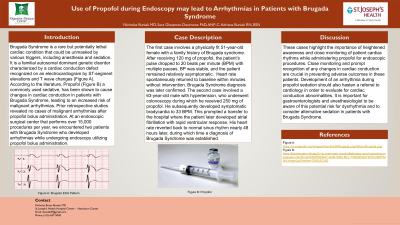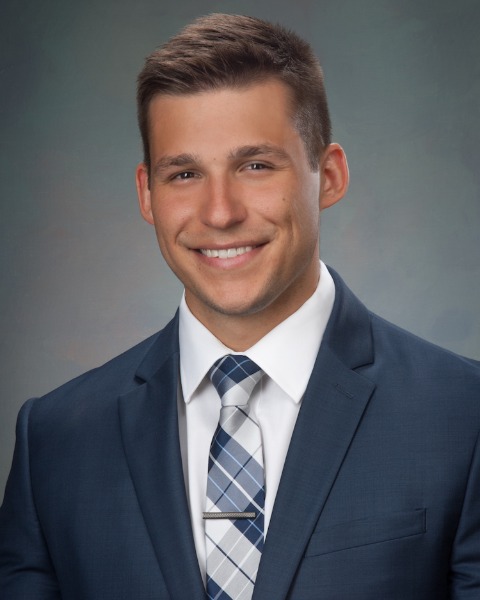Monday Poster Session
Category: General Endoscopy
P2019 - Use of Propofol During Endoscopy May Lead to Arrhythmias in Patients with Brugada Syndrome
Monday, October 23, 2023
10:30 AM - 4:15 PM PT
Location: Exhibit Hall

Has Audio

Nicholas B. Buniak, MD
St. Joseph's Hospital Health Center - Heartburn Center
Syracuse, NY
Presenting Author(s)
Nicholas Buniak, MD1, Sara Gleasman-Desimone, PhD, ANP-C2, Adriana Buniak, RN, BSN2
1St. Joseph's Hospital Health Center - Heartburn Center, Syracuse, NY; 2Gastroenterology & Hepatology of CNY, Liverpool, NY
Introduction: Brugada Syndrome is a rare but potentially lethal cardiac condition that could be unmasked by various triggers, including anesthesia and sedation. It is a familial autosomal dominant genetic disorder characterized by a cardiac conduction defect recognized on an electrocardiogram by ST-segment elevations and T wave changes. According to the literature, propofol, a commonly used sedative, has been shown to cause changes in cardiac conduction in patients with Brugada Syndrome, leading to an increased risk of malignant arrhythmias. Prior retrospective studies revealed no cases of malignant arrhythmias after propofol bolus administration. At an endoscopic surgical center that performs over 15,000 procedures per year, we encountered two patients with Brugada Syndrome who developed arrhythmias while undergoing endoscopy utilizing propofol bolus administration.
Case Description/Methods: The first case involves a physically fit 51-year-old female with a family history of Brugada syndrome. After receiving 120 mg of propofol, the patient’s pulse dropped to 20 beats per minute (BPM) with multiple pauses. BP was stable, and the patient remained relatively asymptomatic. Heart rate spontaneously returned to baseline within minutes without intervention. Brugada Syndrome diagnosis was later confirmed. The second case involved a 63-year-old male with hypertension, who underwent colonoscopy during which he received 250 mg of propofol. He subsequently developed symptomatic bradycardia to 33 BPM. This prompted a transfer to the hospital where the patient later developed atrial fibrillation with rapid ventricular response. His heart rate reverted back to normal sinus rhythm nearly 48 hours later, during which time a diagnosis of Brugada Syndrome was established.
Discussion: These cases highlight the importance of heightened awareness and close monitoring of patient cardiac rhythms while administering propofol for endoscopic procedures. Close monitoring and prompt recognition of any changes in cardiac conduction are crucial in preventing adverse outcomes in these patients. Development of an arrhythmia during propofol sedation should also hasten a referral to cardiology in order to evaluate for cardiac conduction abnormalities. It is important for gastroenterologists and anesthesiologist to be aware of this potential risk for dysrhythmia and to consider alternative sedation in patients with Brugada Syndrome.
Disclosures:
Nicholas Buniak, MD1, Sara Gleasman-Desimone, PhD, ANP-C2, Adriana Buniak, RN, BSN2. P2019 - Use of Propofol During Endoscopy May Lead to Arrhythmias in Patients with Brugada Syndrome, ACG 2023 Annual Scientific Meeting Abstracts. Vancouver, BC, Canada: American College of Gastroenterology.
1St. Joseph's Hospital Health Center - Heartburn Center, Syracuse, NY; 2Gastroenterology & Hepatology of CNY, Liverpool, NY
Introduction: Brugada Syndrome is a rare but potentially lethal cardiac condition that could be unmasked by various triggers, including anesthesia and sedation. It is a familial autosomal dominant genetic disorder characterized by a cardiac conduction defect recognized on an electrocardiogram by ST-segment elevations and T wave changes. According to the literature, propofol, a commonly used sedative, has been shown to cause changes in cardiac conduction in patients with Brugada Syndrome, leading to an increased risk of malignant arrhythmias. Prior retrospective studies revealed no cases of malignant arrhythmias after propofol bolus administration. At an endoscopic surgical center that performs over 15,000 procedures per year, we encountered two patients with Brugada Syndrome who developed arrhythmias while undergoing endoscopy utilizing propofol bolus administration.
Case Description/Methods: The first case involves a physically fit 51-year-old female with a family history of Brugada syndrome. After receiving 120 mg of propofol, the patient’s pulse dropped to 20 beats per minute (BPM) with multiple pauses. BP was stable, and the patient remained relatively asymptomatic. Heart rate spontaneously returned to baseline within minutes without intervention. Brugada Syndrome diagnosis was later confirmed. The second case involved a 63-year-old male with hypertension, who underwent colonoscopy during which he received 250 mg of propofol. He subsequently developed symptomatic bradycardia to 33 BPM. This prompted a transfer to the hospital where the patient later developed atrial fibrillation with rapid ventricular response. His heart rate reverted back to normal sinus rhythm nearly 48 hours later, during which time a diagnosis of Brugada Syndrome was established.
Discussion: These cases highlight the importance of heightened awareness and close monitoring of patient cardiac rhythms while administering propofol for endoscopic procedures. Close monitoring and prompt recognition of any changes in cardiac conduction are crucial in preventing adverse outcomes in these patients. Development of an arrhythmia during propofol sedation should also hasten a referral to cardiology in order to evaluate for cardiac conduction abnormalities. It is important for gastroenterologists and anesthesiologist to be aware of this potential risk for dysrhythmia and to consider alternative sedation in patients with Brugada Syndrome.
Disclosures:
Nicholas Buniak indicated no relevant financial relationships.
Sara Gleasman-Desimone indicated no relevant financial relationships.
Adriana Buniak indicated no relevant financial relationships.
Nicholas Buniak, MD1, Sara Gleasman-Desimone, PhD, ANP-C2, Adriana Buniak, RN, BSN2. P2019 - Use of Propofol During Endoscopy May Lead to Arrhythmias in Patients with Brugada Syndrome, ACG 2023 Annual Scientific Meeting Abstracts. Vancouver, BC, Canada: American College of Gastroenterology.

